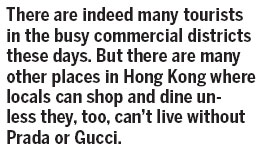Tourism scare exaggerated
Updated: 2013-04-27 05:39
By Hong Liang(HK Edition)
|
|||||||||
Some years ago a top government official rejected criticisms of ignoring the tourism sector, contending that the potential return was too small to justify the high cost. I am sure he was talking about financial cost in building hotels and other facilities to lure tourists.
Now, tourists are flooding into Hong Kong by the millions. And Hong Kong people are complaining about the high social cost. Growing public concern has prompted Chief Executive Leung Chun-ying to initiate an official review of the government policy on tourism, which is touted as a pillar of the local economy although it accounts for no more than 8 percent of GDP.
Meanwhile, there has been a flurry of comments from community leaders and social activists calling for a limit on the number of tourists allowed to visit Hong Kong. But no one seems to know how to do that.
It is unthinkable for the government to impose specific quotas on the number of tourists coming from different countries and territories. We can't wait for those commentators, who objected most passionately to what they described as the tourist invasion that has so rudely disrupted our lifestyle, to produce some ideas on how they think the problem can be solved. But, of course, don't hold your hope too high. I don't think anyone has an idea that doesn't look ridiculous.
We can fault the government for exaggerating the contribution of tourism to our economy. What's more, tourist spending has benefited only a few business segments - hotels, airlines, retailers, caterers and owners of properties in the tourist districts. However, we may have exaggerated the social cost of playing host to the tourist crowd.

In discussing this topic, it is important not to lump it together with the controversies involving mainland mothers coming to Hong Kong to give birth, and the emptying of retailers' shelves of baby milk formula. The Hong Kong government is trying to address these issues separately.
According to commentators, many locals blamed the large number of tourists for indirectly changing the business landscape in the popular commercial areas. In doing so, they have squeezed out the old shop houses and popular cafes that are part of Hong Kong people's collective memory.
As a Hong Kong person, I share much of that collective memory. But I am not so sure if many of those shops and cafes can survive the change of times, with or without a push from the tourists.
Yes. I do miss the many specialty camera shops on Stanley Street in Central. But I haven't bought anything from there for a long time because there are other places that offer more consistent service and better prices. A specialty Leica camera shop on that street, which was still there the last time I was in Hong Kong in March, only takes cash. In case you don't know, a Leica camera and a standard 50 mm lens of the same brand can cost more than HK$100,000. That's a lot of cash to carry around.
A friend of mine lamented that a well-known wonton noodle shop on a busy street in Causeway Bay just closed down. I asked him when he had last eaten there, but he couldn't recall as it was so long ago.
I have fond memories of a coffee shop at the corner of the street where I used to live. But since I moved out many years ago, I have never had the urge to go back, where the sitting is crowded and uncomfortable, the drinks are decidedly old-fashioned, and the service? Forget it.
Changes take place all the time in Hong Kong's open and competitive economy. Tourism sometimes plays a part in the process. In the 1960s and 70s, part of Wan Chai district was populated by sleazy bars catering to visiting United States' sailors on leave from fighting in Vietnam. Since then, Wan Chai has evolved into a new business and commercial area with shops and restaurants that are the favorites of the well-paid office workers in the vicinity.
I do remember that wonton noodle shop my friend missed although I have never eaten there. What I really missed was yaujagwai, or deep-fried dough stick, stands, by the old wet market in Happy Valley. They were long gone, but not because of the tourists.
There are indeed many tourists in the busy commercial districts these days. But there are many other places in Hong Kong where locals can shop and dine unless they, too, can't live without Prada or Gucci.
The author is a current affairs commentator.
(HK Edition 04/27/2013 page4)